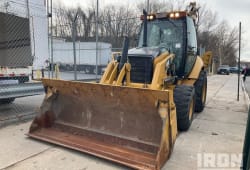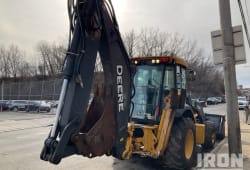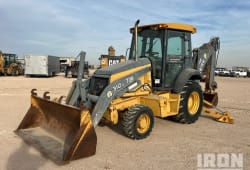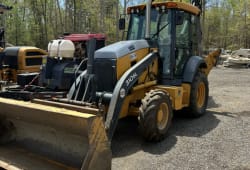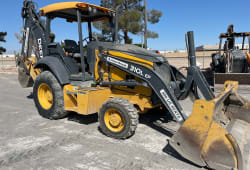Unearthing the Clash: Backhoe vs Excavator Showdown!
10 Min read
)
January 27, 2024
Welcome to the heavy-duty arena where construction machines take center stage - it's the ultimate clash of the titans, the "Backhoe vs Excavator" showdown! Whether you're a seasoned construction professional or just someone curious about the world of heavy equipment, buckle up for an informative and slightly fun ride as we dig deep into the key differences between these two construction powerhouses.
In the construction industry, the choice between a backhoe and an excavator is akin to picking the right tool for the job. It's not just about moving dirt; it's about precision, versatility, and getting the job done efficiently. So, as we embark on this journey, let's first understand the players on our construction battlefield.
The Multitasking Maverick The Backhoe
Picture this: a machine with a dual personality, ready to tackle a variety of tasks with equal finesse. The backhoe is the Swiss Army knife of construction equipment, featuring a front loader for lifting, carrying, and loading materials, and a rear-mounted backhoe for digging, trenching, and all things excavation. It's the all-in-one package for construction projects that demand versatility.
On the Other Side: The Precision Performer The Excavator
Now, shift your focus to a heavy-duty dancer on a rotating stage - the excavator. With its hydraulic arm, bucket, and 360-degree rotating house, the excavator is designed for one thing: precision excavation. This powerhouse is the go-to for heavy digging, trenching, and tasks that require surgical accuracy. It's the maestro orchestrating the construction symphony with finesse.
But wait, why the rivalry? Can't they just get along and coexist peacefully on the construction site? Well, it turns out, each has its strengths, and choosing between a backhoe and an excavator depends on the specific demands of the project.
In this blog series, we'll break down the nitty-gritty details, from design and applications to operation and costs, to help you navigate the "Backhoe vs Excavator" dilemma. So, whether you're a construction aficionado or just someone who loves heavy machinery, join us as we unearth the differences, uncover the specialties, and maybe add a dash of fun to the construction site rivalry!
Definition
Backhoe
:format(webp))
A backhoe is a dual-function heavy equipment machine, integrating a loader at the front for lifting and a backhoe at the rear for digging and excavation. This versatility makes it ideal for a range of construction tasks, offering a combined solution in a single machine.
Excavator
An excavator is a robust construction machine featuring a hydraulic arm, bucket, and cab mounted on a revolving platform known as the house. Specifically crafted for precise digging and excavation tasks, excavators excel in heavy-duty construction projects, showcasing superior capabilities in controlled and detailed operations.
Design and Configuration
Backhoe
Front Loader The front loader at the machine's forefront is a workhorse for lifting, carrying, and moving materials on the construction site. Its versatility makes it indispensable for tasks requiring strength and mobility.
Rear Backhoe Positioned at the back of the machine, the backhoe is the powerhouse for digging, trenching, and excavation. Its reach and precision are crucial for a wide range of construction and earth moving activities.
Excavator
Hydraulic Arm The excavator's hydraulic arm is its main digging apparatus, equipped with a bucket for efficient excavation and lifting operations. The hydraulic system provides the force needed for precise and controlled movements during digging.
Rotating House The excavator's house, or upper structure, can rotate a full 360 degrees. This unique feature enhances maneuverability, allowing the operator to reach any point around the machine without physically repositioning it. This is especially valuable in confined spaces and intricate construction environments.
Purpose and Applications
Backhoe
Versatility A backhoe is a jack-of-all-trades, excelling in a myriad of tasks like digging, lifting, loading, and backfilling. Its ability to seamlessly switch between loader and backhoe functions makes it an invaluable tool for diverse projects.
Construction Widely employed in construction endeavors, landscaping ventures, and utility work, backhoes prove indispensable in tasks that demand a combination of digging and material handling capabilities.
Excavator
Heavy Excavation Excavators are heavyweights in the digging game, designed for robust tasks such as heavy excavation, trenching, and material removal. Their power and stability make them essential in large-scale construction and mining projects.
Precision Work Where finesse is paramount, excavators shine. Their hydraulic arms enable meticulous and precise digging, making them ideal for jobs that require accuracy, like creating foundations or intricate landscaping.
Size and Mobility
Backhoe
Smaller Size Generally more compact than excavators, making them suitable for smaller work sites.
Greater Mobility Easier to maneuver in tight spaces.
Excavator
:format(webp))
Larger Size Excavators are often larger and more powerful, suitable for heavy-duty tasks.
Tracked or Wheeled Available in both tracked and wheeled configurations, with tracked excavators being more common for stability in challenging terrains.
Operation and Controls
Backhoe
Simple Controls Backhoes boast user-friendly controls, making them an ideal choice for beginners. The straightforward interface allows operators to quickly grasp the basic functionalities, enhancing overall efficiency on the construction site.
Two-in-One Operation One of the standout features of a backhoe is its dual functionality. Operators seamlessly transition between the front loader and rear backhoe, providing versatility without the need for complicated control adjustments.
Excavator
Complex Controls Excavators come with sophisticated control systems, reflecting the intricacies of managing the hydraulic arm and bucket. The advanced setup empowers operators with precise control over excavation tasks, albeit requiring a higher level of skill and familiarity.
Specialized Operation Excavators demand a higher degree of training due to their specialized operations. The precision required in manipulating the hydraulic arm for digging necessitates skilled operators who can navigate the nuanced controls for optimal performance.
Cost
Backhoe
Generally More Affordable Backhoes are known for their cost-effectiveness, making them a budget-friendly option. The initial investment and operational costs are often lower, making them a practical choice for smaller construction projects and those with limited budgets.
Suitable for Smaller Budgets and Projects Given their lower cost, backhoes are an excellent fit for projects where financial constraints are a consideration. They provide a balance between functionality and affordability for a range of construction tasks.
Excavator
Higher Initial Investment Excavators come with a higher upfront cost, reflecting their specialized capabilities and heavy-duty design. The initial investment is more substantial, requiring a larger budget commitment from construction companies.
More Suitable for Larger Construction Projects Due to their robust construction and ability to handle heavy excavation tasks, excavators are better suited for larger construction projects where the scale of work justifies the higher initial investment. Their efficiency in handling substantial workloads makes them a preferred choice for sizable undertakings.
Maintenance
Backhoe
Typically Easier and Less Expensive to Maintain Backhoes are known for their simplicity, featuring straightforward mechanical components that are easier and less expensive to maintain. This ease of maintenance contributes to their overall cost-effectiveness.
Simpler Mechanical Components The mechanical components of a backhoe are designed with simplicity in mind. This not only aids in ease of operation but also translates to less intricate maintenance tasks, reducing downtime and associated costs.
Excavator
More Complex Hydraulic Systems Excavators are equipped with intricate hydraulic systems to manage the hydraulic arm and bucket movements. This complexity may necessitate more regular maintenance to ensure optimal performance, adding to the overall maintenance requirements.
Higher Maintenance Costs Compared to Backhoes The sophisticated hydraulic systems and the heavy-duty nature of excavators contribute to higher maintenance costs. Regular inspections and upkeep are essential to keep the hydraulic components in peak condition, making maintenance expenses comparatively higher than those for backhoes.
Which is Better: Backhoe or Excavator?
When it comes to determining which construction machine is better, whether a backhoe or an excavator, the answer depends on the specific needs and requirements of the project.
Each equipment type has its own set of advantages and is better suited for particular tasks. Let's explore the strengths of each, providing a comprehensive comparison to help you make an informed decision:
Backhoe:
Versatility:
Excels in a wide range of tasks, including digging, lifting, loading, and backfilling.
The combination of a front loader and rear backhoe makes it a two-in-one machine suitable for various applications.
Cost-Effective:
Generally more affordable than excavators, making it a practical choice for projects with budget constraints.
Suited for smaller budgets and projects, providing a balance between functionality and cost.
Maneuverability:
Compact size allows for easier navigation in tight spaces and smaller work sites.
Greater mobility enhances flexibility in project execution.
User-Friendly:
Simple controls make it beginner-friendly, reducing the learning curve for operators.
Two-in-one operation simplifies task switching on the job site.
Maintenance:
Typically easier and less expensive to maintain due to simpler mechanical components.
Lower maintenance costs contribute to overall cost-effectiveness.
Excavator:
Heavy-Duty Excavation:
Specialized in heavy digging, trenching, and excavation tasks, making it ideal for large-scale projects.
Excavators handle substantial workloads efficiently, justifying their higher initial investment.
Precision:
Hydraulic systems and advanced controls enable precise and accurate digging, crucial for intricate tasks.
Suited for projects requiring a high level of precision, such as foundation digging and site grading.
Specialized Operation:
Requires skilled operators due to the complexity of controls and precision demands.
Well-suited for projects with experienced operators and specialized excavation needs.
Durability:
Built for heavy-duty work, providing durability and reliability in challenging construction environments.
Long-lasting performance ensures efficiency over extended project durations.
Flexibility in Terrain:
Available in tracked and wheeled configurations, with tracked excavators offering stability in challenging terrains.
Adaptable to various terrains, enhancing flexibility in project execution.
Conclusion
The choice between a backhoe and an excavator boils down to the specific demands of the project. For smaller-scale projects with budget constraints and diverse tasks, a backhoe's versatility and cost-effectiveness make it a preferred choice. On the other hand, excavators shine in large-scale projects where heavy-duty excavation and precision are paramount. The decision ultimately hinges on project requirements, budget considerations, and the level of expertise available for operation. Whether you opt for the all-in-one versatility of a backhoe or the precision excavation capabilities of an excavator, both machines play crucial roles in the construction industry, ensuring that every project can be approached with the right set of tools.

Aaron Kline is the Co-Founder and COO of Boom & Bucket, where he leverages his extensive leadership experience to revolutionize the heavy equipment industry. With a background in building scalable processes and teams from his time as a Naval officer and executive roles in tech, Aaron focuses on introducing cutting-edge technology to construction and agriculture markets. Before Boom & Bucket, he held leadership positions at Skylo and Yard Club (acquired by Caterpillar), and he’s passionate about fostering innovation and driving efficiency in under-digitized industries.

